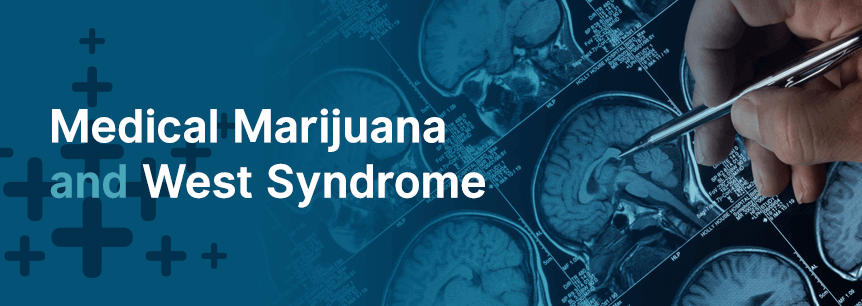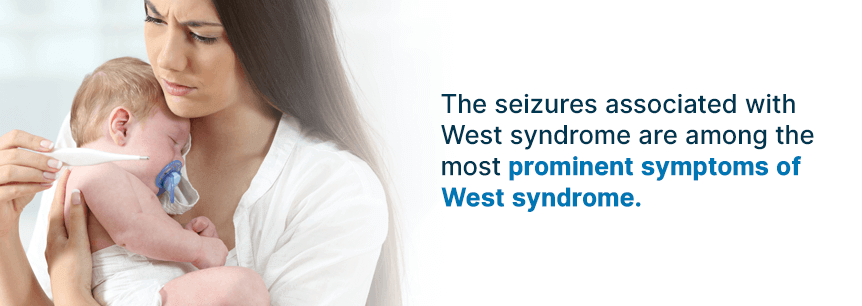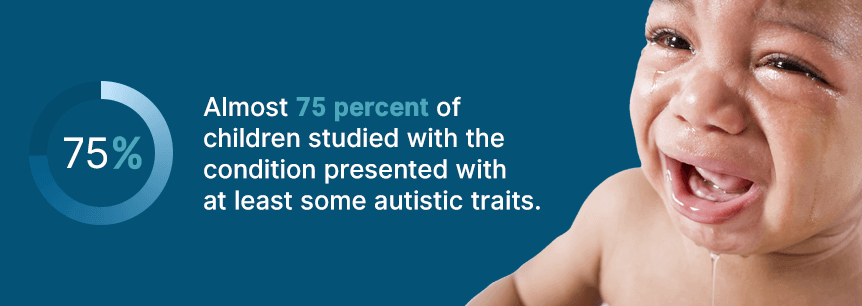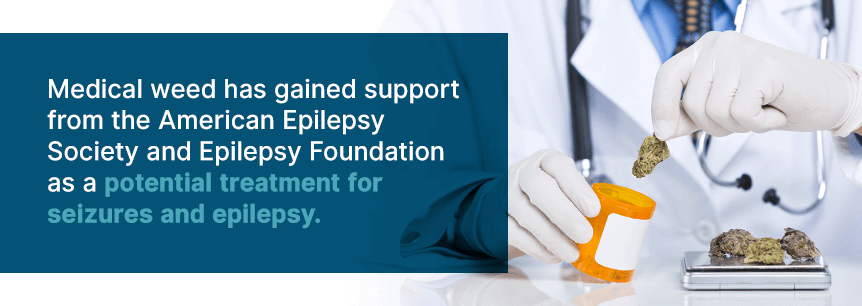
For patients who suffer from seizures, muscle twitching, jerking and other signs of West syndrome, medical cannabis is a great option to keep symptoms under control. Studies have found cannabinoids can substantially reduce seizure frequency and in some cases maybe even stop seizures altogether in children with this syndrome and other forms of epilepsy. Learn more about West syndrome, its symptoms and how medical marijuana and West syndrome treatment can help ease the effects of this condition.
West syndrome is a type of pediatric epilepsy accounting for approximately 30 percent of all cases of epilepsy occurring in infants. Also referred to as “infantile spasms” or “epileptic spasms,” it is a rare condition affecting fewer than six of every 10,000 babies, according to WebMD.
It usually appears between the ages of four and eight months, but can show in infants as early as three months and as late as 13 months. Though both male and female babies can develop West syndrome, nearly six out of 10 infants diagnosed with the condition are male.
Nearly 90 percent of children who have West syndrome suffer severe physical and/or cognitive impairments. While life expectancy with West syndrome varies greatly from case to case, nearly 61 percent of children who have the condition die before reaching the age of 10, while five of every 100 children who have the condition do not survive beyond the age of 5.
The seizures associated with West syndrome are among the most prominent symptoms of West syndrome. The seizures usually last a few seconds and may be pronounced and noticeable, with violent seizures forcing your baby to stiffen, fling arms their wide and bring their knees up toward the chest. The seizures can also be fairly mild.

An infantile seizure may appear as if your baby is twitching or has a muscle tick. Some seizures only affect one side of the body, and babies may cry immediately before or after having the seizure. Visible symptoms letting you know your baby is having a seizure may include the following:
Infantile seizures often occur in clusters of up to 150, according to WebMD. Seizures associated with West syndrome also tend to happen upon waking rather than myoclonic seizures babies may experience as they fall asleep.
Some parents also notice slight or substantial delays in various milestones, such as rolling over or sitting up. In some instances, babies may regress with motor skills, if the condition sets in later in development.
There are essentially three types of West syndrome doctors discuss with parents:
1. Symptomatic West syndrome: With this type of West syndrome, the disorder is caused by another condition that physicians can identify.
2. Cryptogenic West syndrome: The name is given when physicians believe the West syndrome is the result of another health problem but can’t identify the other condition.
3. Idiopathic West syndrome: The name is given to West syndrome cases where the baby was developing normally before getting West syndrome and physicians believe the cause of the condition is genetic instead of the result of another health issue.
The medical community believes a variety of causes can associate with West syndrome but not one definitive cause relates to all cases. Among the most commonly recognized causes are:
Sometimes, the cause is impossible to pinpoint, leaving physicians and parents perplexed about why an infant develops the seizure disorder.
Because the possible causes of West syndrome are so diverse, treatment can be equally tricky, creating a complication in its own right. Babies with West syndrome often have problems with vision, speech, and hearing. They may also have an issue with the development of their fine and gross motor skills and their ability to write. Almost 75 percent of children studied with the condition presented with at least some autistic traits.

Treatments for West syndrome vary according to the cause of the condition if it has been identified. Common treatments used for infantile spasms include:
Most treatments for West syndrome are done to either reduce the number of seizures your baby has or the severity of their seizures. Some of them can also promote positive development that can lengthen your child’s life expectancy and improve your baby’s quality of life as he or she develops.
However, some of these conventional treatments for West syndrome have side effects. For instance, medications, such as steroids and ACTH, can cause crankiness in your baby, along with a weakened immune system and digestive issues.
The anti-seizure medication Vigabatrin can also cause your baby to develop digestive issues, including constipation, stomach aches, and vomiting. A frightening side effect of Vigabatrin is a permanent vision change, such as blurring or even loss.
Medical marijuana can treat the symptoms of West syndrome because of the way it affects the body through the endocannabinoid system (ECS). Press reports and parent testimonials tout the success of medical cannabis in helping with the symptoms of epilepsy and infantile seizures. While no states have approved medical cannabis specifically to treat West syndrome, many states have okayed medical marijuana to treat epilepsy and seizures.

The journal Science first described the ECS biological system in 1992. It releases human cannabinoids, which interact with cannabinoid receptors you’ll find in embedded tissues of your cell membranes. There are cannabinoid receptors in your lungs, brain, kidneys, liver and immune system.
Both the psychoactive and therapeutic properties of medical pot occur when there’s cannabinoid receptor activation from a cannabinoid. Cannabis’ powerful healing properties are due to its high cannabidiol (CBD) content as well as significant levels of medical flavonoids, terpenes and tetrahydrocannabinol (THC).
Epidiolex, a plant-based CBD formulation in the form of a cannabidiol oral solution, was recently approved by the Food and Drug Administration (FDA) for treating seizures in individuals 2 years old and older with Lennox-Gastaut syndrome and Dravet syndrome.
The herb has been used since the 19th and 20th centuries as a botanical medicine. These days, cannabis’ claim as a possible remedy has the support of countless studies crediting the potential of its healing abilities from its CBD content. More and more doctors see the health benefits and effectiveness of medical cannabis for a variety of medical conditions, including West syndrome.
Your ECS is a regulatory network that plays a role in seizure activity reduction. Cannabinoids interact with this regulatory network.
Your body makes its own cannabinoids, referred to as endocannabinoids, that studies show act positively on regulating seizure intensity and threshold.
Research shows it’s the cannabinoid receptor 1 (CB1) cannabinoids interact with that helps reduce or eliminate seizures. The CB1 receptor, when stimulated, decreases neurotransmission, a process where a neuron axon nerve fiber’s terminal releases neurotransmitters or signaling molecules that bind and react to your receptors on the extension of another neuron, and produces an overall decrease in neuronal excitability.
Medical marijuana for West syndrome treats symptoms such as the following.
Medical weed has gained support from the American Epilepsy Society and Epilepsy Foundation as a potential treatment for seizures and epilepsy. Many individuals struggling with a seizure disorder find cannabis provides great relief when used with other traditional medicines or taken by itself. Other people suffering from seizures who can’t tolerate medicines for seizures have successfully used weed to control their seizures.

CBD has provided some positive effects on different body systems, and it’s not psychoactive like THC, thereby not producing the “high.” It’s these positive effects that make CBD so effective in reducing seizures in some patients. Recently, various studies show specific plant-based CBD products are beneficial in treating certain groups of individuals with epilepsy who don’t respond to standard therapies.
Some good strains to try to help treat seizures are:
In a well-known case of medical marijuana for children, Charlotte Figi, a toddler who suffered from seizures, began treatments with cannabis oil at 5 years of age. The oil was low in THC but high in CBD. After Charlotte took the cannabis oil, both the intensity and frequency of her seizures decreased significantly, providing the inspiration behind the strain’s name of Charlotte’s Web. If your child is taking conventional anti-seizure medication for the condition and it’s causing nausea and vomiting, medical marijuana may help curb this effect.
Muscle jerking and tremors are other common symptoms of West syndrome. They’re not the same as seizures. Stress can increase these tremors. Medications, like marijuana and West syndrome treatment, meant for enhancing relaxation mitigate this stress response and reduce tremors in some individuals.
There’s a complex interaction between how severe symptoms are and psychological or physical well-being and how active individuals are. Medical pot could potentially affect any of these factors. Marijuana for West syndrome strains to try for tremors are:
Over 30 years ago, scientists found how cannabis’ bioactive ingredients mimicked the endocannabinoids of your body. These neuro-chemicals control the receptors of your brain responsible for balancing pain and inflammation.
Doctors point out both psychoactive and non-psychoactive types of marijuana-based medicines work well for almost all types of headaches. THC and CBD, as well as other cannabinoids in medical cannabis, eliminate the inflammation causing headaches by interacting with the body’s CB1 receptors.
For headaches, try these strains:
If you or your doctor believe your infant may have anxiety related to their West syndrome symptoms, medical cannabis can help with that, too, as studies suggest a positive effect of cannabis on anxiety. For example, in one study, a team of researchers found a minimum of 10 puffs of cannabis high in both THC and CBD led to substantial reductions in self-reported stress and two puffs of the medicine with any level of THC and CBD reduced anxiety. Obviously, an infant will take the cannabis in a different manner.
The team used a Canadian app, Strainprint, to track medical weed use and the severity of symptoms of around 280 health conditions. The team assessed about 12,000 adults for this study, who were following their symptoms, including anxiety, with the app. Around 20 minutes after marijuana was administered, the users had to report the severity of their symptoms using a scale ranging from one to 10. Overall, the users reported a 58 percent reduction in their anxiety levels.
Medical marijuana and West syndrome strains for anxiety include:
Use of cannabis can lead to side effects like:
Cannabis impacts your central nervous system. It could slow it down too much when combined with medications during surgery, like anesthesia. Medical cannabis patients should stop using cannabis at least two weeks before a scheduled surgery.
Medical weed can be taken in multiple ways, including inhaling smoke, vaping and consuming edibles. Since West syndrome predominantly affects infants, using a liquid form of marijuana, particularly an extract of CBD oil, could be the preferred delivery method. You can use a syringe to measure the dosage recommended by your medical marijuana doctor and to deliver the dosage to your infant. Your infant’s doctor may recommend starting with a very low dose to see its impact in reducing or eliminating seizures, and then gradually increase the dose as advised or needed.

Beverages might be an option as well. You can work with your medical marijuana doctor to discuss the best dosage and method to use cannabis for your infant’s West syndrome symptoms.
Your child’s West syndrome diagnosis can be scary. But many states where medical cannabis is legal allow the use of medical cannabis for seizures and epilepsy. If you’re looking for a supplement treatment or if your child is not responding to the standard treatment, medical marijuana for West syndrome could be your solution.
Marijuana Doctors can connect you with hundreds of licensed and qualified cannabis doctors all over the U.S. where the herb is legal, so you stay in compliance with the laws of your state. Book an appointment with one of our cannabis doctors, browse our list of dispensaries and improve your child’s quality of life.
Find A Doctor Find A Dispensary